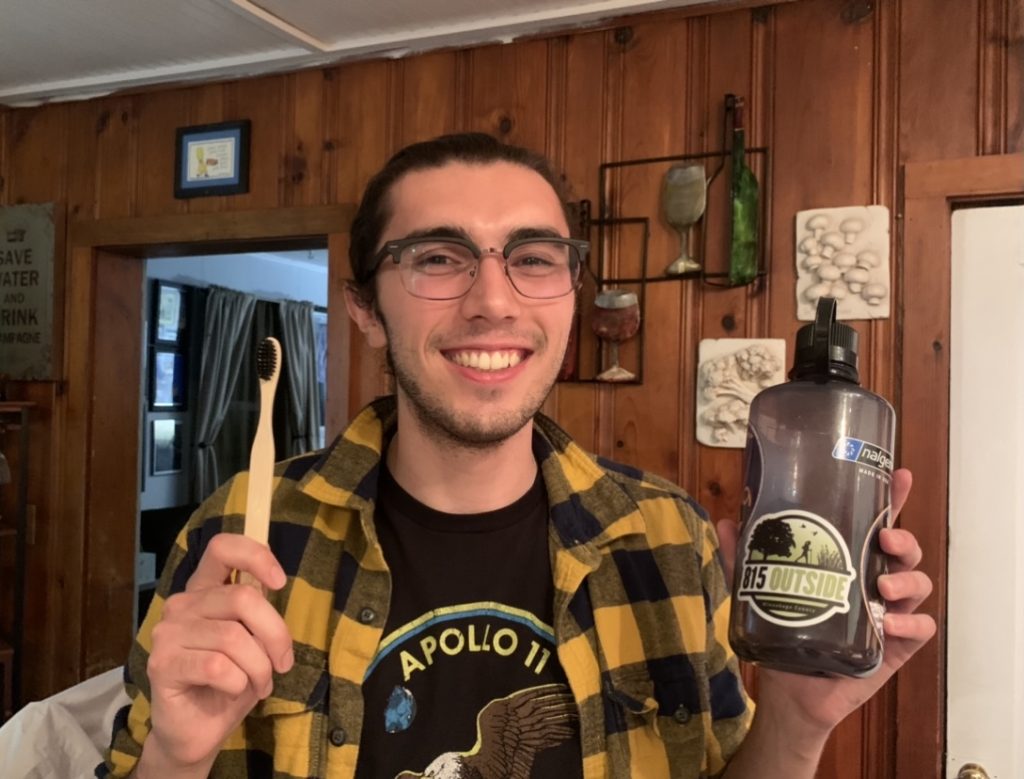For this week’s interview, we meet Chris, a history student at UW-Whitewater. He narrows in on the environmental issues that have to do with plastic pollution and what that means in terms of sustainability. He also provides some solutions to this issue too.
What does Sustainability mean to you?
“To me, sustainabile living comes to mind right off the bat. A lot of the things we do in our daily lives is unsustainable. Plastic is a main thing that we can’t always reuse, so it just piles up. It’s not sustainable to use, but there are alternatives, like using a reusable water bottle. A lot of people just use a one-time-use plastic water bottles and just throw them out, which just adds to the piles of plastic. For sustainability I just think of different lifestyles for both economic and environmental sustainability. People can save the environment and save money by not continuously buying cases of plastic water bottles.”
Why does it matter?
“Sustainability matters because in just one household – like the one I live in is just with three people – you can see how much plastic waste adds up in just the course of a week. Thinking about a normal-sized family, which would probably be bigger than three, who have that same build up also on a weekly basis – that’s a lot of plastic that can add up within a state let alone a country.”
Are there any practices that you implement in your everyday live to make it more sustainable? If so, what are they?
“I use reusable water bottles a lot, like I said. There’s both reusable plastic bottles and reusable metal bottles that are available if you want to get away from plastic completely. Simple things, even like blowing your nose: a lot of people just use individual tissues that all get thrown away. I use a bandanas or handkerchiefs. I like to carry them around in my backpack or whatever to blow my nose if I need to, and then of course wash them later. There’s toothbrushes too – the one I have is bamboo. You can compost it in a compost, so it’s not something you have to worry about throwing away or where it’s going to go after you throw it away. I use both of these everyday. I only use a one-time-use plastic water bottle unless it’s my only choice. I’ve carried a reusable water bottle around since high school. Because I was a runner, it was always just easier to have rather than a single use bottle each day or having my dad spend money on them all the time.”
Was there a certain moment that made you want to make these changes?
“I took a class at Rock Valley College, the college I went to before Whitewater, and it was Environmental Ethics. It opened up my eyes a lot to a lot of subjects, many regarding sustainability. It showed me that there’s a lot of problems and that we live unsustainably in America. That class probably opened up my eyes the most.”
In terms of an ecological footprint, which is the amount of land required to supply resources and abroad wastes of a person, it would take four earths to provide for every human if everyone lived like Americans do.
Do you personally know of many people who have a similar practice or lifestyle as you?
“Most people I would know or be friends with, they use reusable water bottles like I do, but I think it’s because a lot of them were in sports, so it just made sense to carry around a reusable one. I think with the water bottle thing, it’s not because they know what sustainability is or that they are thinking about it, it’s just more helpful. So I’d say 70 or 80 percent of people I know use a reusable water bottle too, but not for the same reason.”
At a local or national level, what can we do to make sustainable change?
“When it comes to plastic, which adds up in our landfills and other countries landfills – it’s all our world space and it will all add up. It also puts toxics into our water that we drink. In Germany they have a system that is vey good with recycling plastic. They actual pay their citizens to bring the plastic back – kind of like we do with cans here. It’s a good incentive for people to want to recycle. And this is just one example. At a government level, I think economic incentives are they most successful at getting people to want to do something.”
What barriers do you think there are for individuals or society for not switching to more sustainable methods of living?
“It’s just money; it’d be more expensive to switch. That’s the main thing.”

Leave a Reply